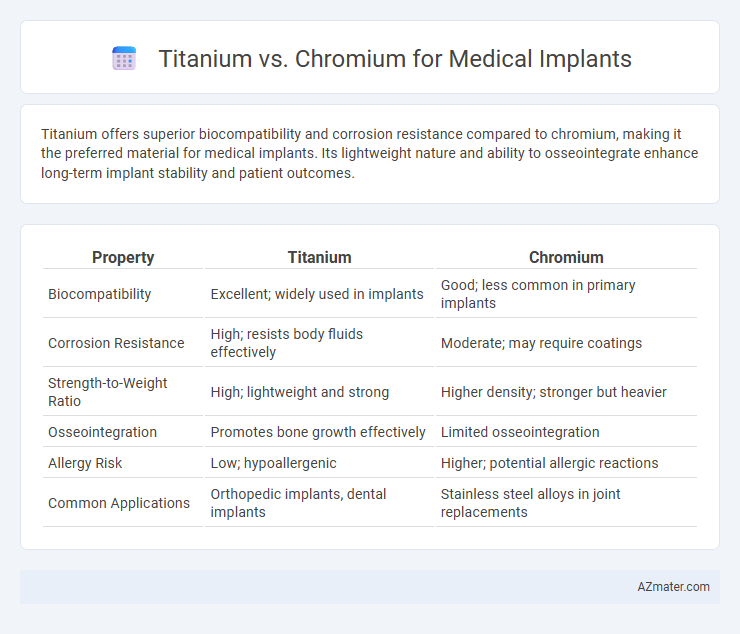Titanium offers superior biocompatibility and corrosion resistance compared to chromium, making it the preferred material for medical implants. Its lightweight nature and ability to osseointegrate enhance long-term implant stability and patient outcomes.
Table of Comparison
| Property | Titanium | Chromium |
|---|---|---|
| Biocompatibility | Excellent; widely used in implants | Good; less common in primary implants |
| Corrosion Resistance | High; resists body fluids effectively | Moderate; may require coatings |
| Strength-to-Weight Ratio | High; lightweight and strong | Higher density; stronger but heavier |
| Osseointegration | Promotes bone growth effectively | Limited osseointegration |
| Allergy Risk | Low; hypoallergenic | Higher; potential allergic reactions |
| Common Applications | Orthopedic implants, dental implants | Stainless steel alloys in joint replacements |
Introduction to Titanium and Chromium in Medical Implants
Titanium is widely favored in medical implants for its exceptional biocompatibility, corrosion resistance, and high strength-to-weight ratio, making it ideal for bone and joint replacements. Chromium, often utilized in cobalt-chromium alloys, offers superior hardness and wear resistance, which ensures durability in load-bearing implants like hip and knee prostheses. The choice between titanium and chromium hinges on the specific mechanical demands and biological environment of the implant site.
Material Properties Comparison: Titanium vs Chromium
Titanium exhibits superior biocompatibility and corrosion resistance compared to chromium, making it the preferred choice for medical implants. Its lower density and higher strength-to-weight ratio enhance patient comfort and implant longevity, whereas chromium, although hard and wear-resistant, can pose biotoxicity risks due to ion release. Titanium's ability to form a stable oxide layer ensures better osseointegration and minimal inflammatory response in implant applications.
Biocompatibility and Body Response
Titanium demonstrates superior biocompatibility compared to chromium, as its oxide layer promotes osseointegration and reduces inflammatory responses in medical implants. Chromium, often used in stainless steel alloys, can release ions that may cause allergic reactions or cytotoxicity in sensitive patients. Titanium's corrosion resistance and minimal ion release lead to enhanced body responses, making it the preferred choice for long-term implant success.
Corrosion Resistance in Biological Environments
Titanium exhibits superior corrosion resistance in biological environments due to its stable oxide layer, which prevents ion release and reduces inflammatory responses in medical implants. Chromium, often used in stainless steel alloys, enhances corrosion resistance but is more prone to localized corrosion such as pitting and crevice corrosion under physiological conditions. The biocompatibility and long-term stability of titanium make it a preferred choice for implants requiring high corrosion resistance in body fluids.
Mechanical Strength and Durability
Titanium exhibits exceptional mechanical strength and corrosion resistance, making it ideal for long-lasting medical implants that endure cyclic stress and bodily fluids. Chromium, often used as an alloying element in stainless steel, enhances hardness and wear resistance but is more prone to corrosion in biological environments compared to titanium. Titanium's superior biocompatibility and fatigue resistance ensure greater durability and reduced risk of implant failure over time.
Implant Longevity and Performance
Titanium offers superior corrosion resistance and biocompatibility, promoting longer implant longevity by minimizing immune response and integrating well with bone tissue. Chromium, often used in stainless steel alloys for implants, provides high strength and wear resistance but may pose risks of metal ion release and allergic reactions, potentially affecting long-term performance. Implant longevity and performance are optimized by selecting titanium-based materials for their enhanced osseointegration and reduced risk of implant failure.
Allergic Reactions and Toxicity Concerns
Titanium is widely preferred for medical implants due to its exceptional biocompatibility and low risk of allergic reactions, making it suitable for patients with metal sensitivities. Chromium, often used in stainless steel alloys, poses a higher risk of causing allergic dermatitis and metal ion release, potentially leading to toxicity and inflammatory responses. Studies indicate titanium's corrosion resistance minimizes ion leaching, reducing systemic toxicity, whereas chromium ions can provoke adverse immune reactions, impacting long-term implant success.
Applications in Orthopedic and Dental Implants
Titanium demonstrates superior biocompatibility and corrosion resistance, making it the preferred choice for orthopedic implants such as joint replacements and bone plates due to its ability to integrate well with bone tissue. Chromium is primarily used in stainless steel alloys and cobalt-chromium alloys, offering high strength and wear resistance, which are critical for load-bearing dental implants and orthopedic components like knee and hip prostheses. The osteointegration properties of titanium promote faster healing in dental implants, while chromium alloys excel in durability under mechanical stress in long-term implant applications.
Cost and Availability in the Medical Industry
Titanium is widely preferred in medical implants due to its favorable cost-to-performance ratio and high biocompatibility, making it more readily available and budget-friendly in the healthcare industry. Chromium, often used as a coating or alloy component, is less common due to higher costs and limited availability as a pure metal for implants, impacting its widespread use. Manufacturing titanium implants benefits from established supply chains and scalable production, reducing overall expenses compared to chromium-enhanced alternatives.
Future Trends and Innovations in Implant Materials
Titanium remains the gold standard for medical implants due to its exceptional biocompatibility, corrosion resistance, and strength-to-weight ratio, while emerging innovations in chromium alloys aim to enhance wear resistance and antimicrobial properties. Future trends emphasize surface modifications and nanostructuring of titanium to promote faster osseointegration and reduce infection risks, alongside the development of chromium-based coatings that improve implant longevity and reduce metal ion release. Advanced additive manufacturing techniques enable the design of patient-specific implants combining titanium's mechanical benefits with chromium's enhanced surface functionalities, driving next-generation personalized implant solutions.

Infographic: Titanium vs Chromium for Medical Implant
 azmater.com
azmater.com